- Home
- Cheryl Bolen
My Lord Wicked (Historical Regency Romance) Page 3
My Lord Wicked (Historical Regency Romance) Read online
Page 3
Just looking at her perfection made Freddie feel even more uncomfortable.
A footman silently appeared beside Freddie, filling her glass with wine. How ridiculous it was to have two footmen for two diners, she thought. And she was stunned over the number of tapers lighting the room--enough to have lighted her old cottage for a year. Her thoughts immediately turned to the parsimonious Aunt Dorothea. She could almost hear the woman bemoan the cost of the tallows.
"I trust you rested well after your tedious journey," Lord Stacks said as a footman spooned soup into his master's bowl.
"Yes, my lord. The bed is quite the most comfortable one I've ever used." She thought back to the straw mattress she had slept on back at Chilton Manor.
"I must extend my sincerest apologies for not treating you with the accordance a young lady deserves. I regret that you had to travel by post chaise. Had I known you were not a young man--"
"Pray, do not give it another thought. I assure you I am not accustomed to being treated as a lady."
His brows rose. "It is my ardent desire you be accorded every courtesy here at Marshbanks Abbey."
"You are much too kind, my lord."
She kept looking at the portrait which must be of Lord Stack's dead wife. It dominated the room like a full moon in a black sky. She was drawn to the woman's clear blue eyes that seemed to dance with mischievous delight. Unconsciously, Freddie sensed the woman's closeness. She could almost feel the sheer fabric of her elegant gown. She could almost hear the soft chink of pearls at her smooth throat as she tossed her head in laughter during a jolly gathering around this very table. Undoubtedly, her conversations had been clever and gay. Not silent and plain like Freddie.
Freddie felt more self conscious than ever. How dull she must appear when he was used to someone who sparkled like the woman in the painting.
The footman cleared away the soup bowls and placed a dozen or more covered serving dishes between Lord Stacks and Freddie.
She was astonished over the plentitude. Mutton chops. Boar's head. Beef rounds. Pheasant pie. Haddock. And every vegetable that was currently in season, many of these swimming in French sauces. Did all noblemen eat like this?
If the lovely woman of the portrait had not succeeded in making Freddie feel like a fish out of water, the richness of Lord Stacks' table certainly did.
Freddie lifted first one cover, then another, dishing modest portions onto her fine porcelain plate, wondering if the vast amount of leftovers would later serve the legions of servants.
After dinner—mostly eaten in silence—Lord Stacks invited her to join him in the great hall.
"You must play for me," he encouraged when they reached the room.
Her heart beat wildly. "I fear I cannot, my lord."
"Come now, Miss Lambeth. You obviously display feminine modesty."
She met his gaze squarely. "I assure you I have neither the desire nor the patience for such coquetry."
"Very well," he said, thumbing through a stack of sheet music. "Play something simple so your lack of skill will not be apparent."
"I cannot."
He dropped the dog-eared pages and spun to face Freddie. "You mean you do not play at all?"
She slowly nodded. "I know nothing of music."
He looked at her, his expression puzzled, then soft, as if he pitied her. "Your home must have been quite somber without music."
Defiance flashed in her eyes. "Quite."
"Tell me, what did you do for amusement in the evenings?"
"Like my father, I am rather fond of parlor games."
"Indeed? If I remember correctly, Frederick was extremely competitive in his play. And you?"
"I fear I'm unfemininely competitive." It seemed everything about her lacked femininity. Not like the woman in the portrait.
He began walking to a square game table. "What I crave is a good game of whist. German whist is good for two players. Can you oblige?"
Her lips curled into a smile. "I should be happy to, my lord."
It was the first time he had seen her smile. The rare smile was almost seductive. It seemed to belong to someone else. A woman, perhaps. Not a girl barely eighteen.
He won the first game, she the second. He admired her play. Damned if he wasn't enjoying every minute. He could not remember the last time he had played with as skillful a player. Damned if he could remember the last time anyone had beat him.
As she warned, she took her play seriously. No feminine batting of the eyelashes. No giggling. No exasperated bemusings. Just quiet, competent play.
There was something so different in her manner now, a self assurance that was absent today and at dinner. Even without fashionable clothing, she seemed almost regal, sitting there so straight, her expression intent, her slender fingers arranging the cards. Nothing about her belied her lack of years.
During their play, he told her he wanted to take her to York on the morrow. He wouldn't tell her now that he intended to get her a new wardrobe. Somehow he knew if he told the girl about the shopping tonight, her fierce pride would cause her to protest. Just like she had done about the maid. He could wait until they got there, then he would just happen to lead her into one of those shops Elizabeth used to frequent.
He had avoided York since Elizabeth's death. Too many painful memories. But if he could continue on at Marshbanks Abbey where even the very walls seemed to echo Elizabeth's horrifying death, he could stomach the sight of the places that had once brought her joy.
He had intended to inform Freddie at dinner that he was sending her back. Then he planned to casually mention it when they were playing cards. But the play came to an end--with him barely taking the third game--and still he had failed to tell her.
He walked her to the door of her room, fully intending to tell her, but still did not do so.
He would ply her with beautiful clothes tomorrow. Then he would tell her.
Chapter 3
After several days traveling in a coach, the last thing Freddie desired was to take a long coach ride to York. Nevertheless, she was. She had been touched that Lord Stacks offered to personally accompany her. And she could not deny that seeing York held great allure for her.
She rose early after an exceptionally good night's sleep--most likely the result of the wine she had consumed at dinner--and dressed in her only day dress, the faded muslin. Then she strolled into the dining room five minutes earlier than the eight o'clock time her guardian had set for breakfast.
A curious conversation was being conducted at the opposite end of the room between Lord Stacks and Mrs. Greenwood, neither of whom appeared to hear Freddie approach.
"You have instructed Cook to prepare a luncheon for our journey?" Stacks inquired.
"I have," Mrs. Greenwood said icily. "I requested lunch for three. Surely you forgot to mention a maid to accompany Miss Lambeth."
"Miss Lambeth has no maid," he answered sharply.
"But, my lord---"
"You think the girl will be in danger alone with me, Mrs. Greenwood?"
Freddie's step froze.
"No, my lord," Mrs. Greenwood said feebly. "It is only the propriety."
He glared at the housekeeper, his black eyes flashing in molten anger. "I assure you Miss Lambeth's virtue will remain intact."
Freddie coughed. "Good morning." She tried to sound cheerful.
Mrs. Greenwood shot a steely glance at her, spun around to present her back to Freddie, and went off toward the room Freddie guessed was the kitchen.
During breakfast Lord Stacks spoke little. Freddie attributed his sulkiness to the confrontation with his housekeeper.
Freddie, too, did not feel like talking. Her mind whirled with Mrs. Greenwood's unspoken accusations. The woman's impertinence shocked Freddie, but not as much as her implications. Did his lordship have a reputation for seducing young servants? Is that why Mrs. Greenwood could speak in such a manner to her employer?
Would her guardian try to make Freddie his mistress? She doubte
d it. The man had treated her as if she were a child. And God knows, she was not the least bit attractive. A man who had loved the woman in the painting could never be attracted to her, the unfemininely tall Freddie Lambeth. And though Lord Stacks could have called her Freddie, he was careful to call her Miss Lambeth, to erect a formal barrier between them. He did not at all seem the type to seduce young maidens.
Nevertheless, she would be very careful.
During the ride to York her guardian enlightened her on the local history as he enthusiastically showed her his beloved countryside and its landmarks along the way. The low rock walls that criss-crossed the pastures fascinated her. Lord Stacks had explained that they had been constructed generations ago without the use of mortar. With their even rows of variegated stone, they were a work of art.
It was easy for her to understand why he shunned London society when the North Country so obviously owned his heart.
"I daresay," he said to her, "a girl such as yourself would find nothing to admire here. No young people or gaiety."
Her eyes flashed. "On the contrary. Its isolation from the masses is what gives the North Country is own peculiar charm - - -" She clenched shut her mouth, angry with her own traitorous tongue. She had not meant to tell her guardian how appealing she found Yorkshire. She had not wanted him to ever know she wished to stay here where she was undoubtedly not wanted. She would rather live in a hollowed-out tree than be the object of her guardian’s — or anyone’s — pity.
"Is that because you can never be comfortable in fashionable drawing rooms, Miss Lambeth?"
Her gaze connected with the solemnity of Lord Stacks’. How well her guardian understood her. Not that digging into her thoughts was necessary to comprehend her social inferiorities.
One had only to look at her.
She shrugged. "It is not so much a matter of being comfortable in those drawing rooms, my lord," she said. "It’s more a matter of having a desire to be there in the first place. I don’t. I won’t. And I never shall."
He regarded her with amusement. "Do you mean to say you prefer the solitude of a place like Marshbanks Abbey?"
She did not know how to respond. She could not wound him by disparaging his home, nor did she wish to sound a pathetic note by extolling her fondness for his home — hence, making him feel compelled to keep her there against his own wishes. "Allow me to say I completely understand why you never visit London, my lord. Were I you, I would be perfectly happy at Marshbanks Abbey."
Those black eyes of his flashed, and one side of his mouth lifted ever so slightly. "But, my dear Miss Lambeth, I asked what you prefer."
Freddie could not tell a lie. "A lonely landscape like the one outside our window suits me most agreeably."
He leaned back into the squabs and stretched out his long legs, an inscrutable look on his face as his gaze returned to the window.
Despite her fascination over the stony coastal land, the incident with Mrs. Greenwood in the dining room occupied much of Freddie's thoughts during the journey. It made her conscious that she was no longer a girl but a young woman, though she did not feel particularly feminine. She had only to look at her worn, unfashionable clothing to know she was utterly unattractive. Surely she did not have to worry about Lord Stacks pressing unwanted attentions upon her.
Not when he had loved the woman in the painting.
The carriage followed the River Ouse until the spires of a great cathedral came into view. York. Her heart fluttered with excitement as she sat up and pressed her face against the cool glass.
Even from this distance it was apparent that York was a great deal smaller than London. Yet there were similarities between the two. Both had once been walled cities, and both straddled a river.
They drew closer to the quaint medieval town of intersecting alleyways too narrow for Lord Stacks’ fine carriage.
When her guardian began to show her York from their carriage, Freddie was surprised he had so long stayed away from the quaint medieval town of intersecting alleyways too narrow for a carriage such as Lord Stacks'. She could see he held great affection for the city.
Once they left the carriage to explore the city she could well understand its charms. They walked along the great wall which enclosed the city, and she could almost imagine what it must have been like to gaze down at assaulting marauders many centuries earlier. Then they followed the walk beside the River Ouse. Later, he showed her York Minster.
"It's larger than Westminster Abbey," he said calmly.
Yes, she could believe that. The church was immense. She came to the huge altar and fell to her knees to offer a prayer of thanks for the gift of this day. This day in splendid York. How wondrous it was for a girl who, until three months ago, had never been outside of the rural village of Chelseymeade.
They left the cathedral and began walking down High Petergate.
"It seems every street in York has the word gate in it," Freddie mused aloud.
He nodded. "That comes from the old Norse word gata for street."
"So York dates to before the Conquest."
"Well before."
On a small alleyway off Low Petergate, she grew alarmed when he suggested they pay a visit to Mrs. Baron's modiste shop. She bristled. He does want to make me more attractive. "I cannot allow you to buy me clothing, my lord," she protested.
He came to an abrupt halt and gazed down at her. She felt the scrutiny of his all-seeing eyes. "Your present state of attire embarrasses me, Miss Lambeth," he said bluntly. "A poor guardian I would be were I to allow my ward to walk about in rags, and I assure you the money is a pittance to a man of my wealth."
When he spoke to her like that, she knew he would never consider her for a mistress. His tone was too much like that of a scolding father, and she felt like a naughty child even though she had done nothing wrong, save that for which she was powerless to control: her pitiable appearance.
How could she refuse when she knew her present appearance was an embarrassment? Her face flaming, she nodded in surrender.
Mrs. Baron herself came flying to the front of the shop when she was told Lord Stacks was gracing her establishment with his presence.
"My lord!" the plump redheaded modiste shrieked happily. "'Tis so very good to see you again. It broke my heart to learn of Lady Stacks' passing." She raised her eyes heavenward. "Such a beauty."
Her gaze turned to Freddie as Freddie removed her old bonnet which was covered in black crepe to signify mourning. To Freddie's relief, the modiste did not recoil at her dowdiness. "And who have we here?"
"My ward, Miss Freddie Lambeth. Her father was at Oxford with me. As you can see, she is in need of clothing appropriate to her station."
Mrs. Baron stared at Freddie for a moment, nodding approvingly. "I think we will make her into something very lovely. She will wear clothes quite well with her height." She smoothed Freddie's hair with a gentle hand. "You will need to cut this, my dear."
Freddie knew shorter, curly hair was all the rage with women of fashion. She knew, too, that her own hair was a fright. But having no desire to look as if she had been attacked by a drunken barber, Freddie would entrust the cutting of her hair to no one back in Caldwell.
She nodded.
During the next hour she tried on lovely day and evening dresses in every color and allowed Mrs. Baron to take her measure. Freddie's embarrassment bordered on humiliation. What a burden she must be to Lord Stacks! If only she were lovely when attired in all the finery. Perhaps that would have compensated for her many deficiencies. But despite her proud bearing and Mrs. Baron's artistry with the needle, Freddie was sure she would resemble nothing so much as a well clothed flag pole. A pity she compared so poorly to the beautiful Lady Stacks.
Lord Stacks stayed, approving and rejecting the dresses Mrs. Baron brought out. A heavily flounced pink he deemed not in her style at all and a gray wool he found much too severe. "Since you have so little color, I should think the blues and greens and colors of the earth would d
o well for you, Miss Lambeth," he said.
His observation on her lack of color made Freddie lament that she could not be more like the woman in the portrait. The woman with the innocent blue eyes and soft pink cheeks. The woman with hair sparkling like spun gold.
For herself, Freddie thought one new muslin day dress and one gown for dinner would suit her meager needs, but his lordship insisted she possess morning dresses in every color, several pelisses, a spencer and three evening gowns though she protested that she had nowhere to wear ball gowns.
"Perhaps you will have some kind of a season, Miss Lambeth," he said. It was as if he were grooming her to be a mistress. She wanted to refuse his generosity, but she did not want to cause a scene in Mrs. Baron's establishment.
Freddie stood before him in a rust-colored muslin, feeling oddly elegant. The color complemented her, as did the dress. Its bodice was lower than anything Freddie had ever worn, but she did not feel self conscious. She felt feminine for the first time in her life. She actually possessed a bosom, small as it may be. And the dress made it look rather nice.
"It would please me greatly, Miss Lambeth, if you would wear that dress today," Lord Stacks said. He pointed out a nearby chocolate colored pelisse trimmed in rust ribbands and rust velvet collar. "With that pelisse."
"A most satisfactory choice, my lord," Mrs. Baron said with sincerity.
"But the expense---" Freddie protested.
"My dear child," Lord Stacks said, "your father left you in the care of a very wealthy man. And since I have no children of my own, indulge me."
Freddie nodded silently, secretly glowing over the prospect of wearing the lovely ensemble. Despite that Freddie had never owned beautiful clothing, she possessed a strong sense of what she liked--and disliked--and was pleased that her taste nearly coincided with her guardian's. She agreed that pink was not at all right for her and neither were ruffles and flounces.
"Now that you have my ward's measure, Mrs. Baron," Lord Stacks said, "I would like for you to appropriately size the garments we selected, and I will have a servant pick them up later this week."

 With His Lady's Assistance (The Regent Mysteries Book 1)
With His Lady's Assistance (The Regent Mysteries Book 1)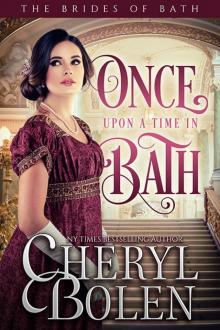 Once Upon a Time in Bath
Once Upon a Time in Bath One Room at the Inn (The Lords of Eton Book 4)
One Room at the Inn (The Lords of Eton Book 4) His Lady Deceived
His Lady Deceived Last Duke Standing
Last Duke Standing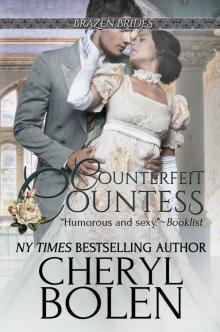 Counterfeit Countess: Brazen Brides, Book 1
Counterfeit Countess: Brazen Brides, Book 1 A Duke Deceived (The Deceived Series Book 1)
A Duke Deceived (The Deceived Series Book 1) An Egyptian Affair (The Regent Mysteries Book 4)
An Egyptian Affair (The Regent Mysteries Book 4) Winter Wishes: A Regency Christmas Anthology
Winter Wishes: A Regency Christmas Anthology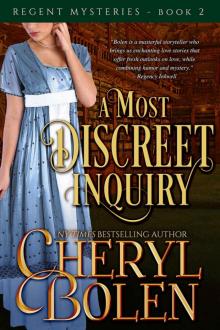 A Most Discreet Inquiry (The Regent Mysteries Book 2)
A Most Discreet Inquiry (The Regent Mysteries Book 2) The Portrait of Lady Wycliff
The Portrait of Lady Wycliff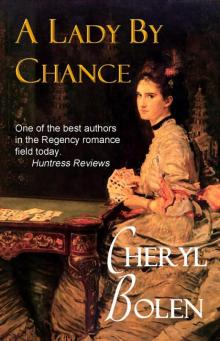 A Lady by Chance (Historical Regency Romance)
A Lady by Chance (Historical Regency Romance) His Lordship's Vow (Regency Romance Short Novel)
His Lordship's Vow (Regency Romance Short Novel) Lady Sophia's Rescue (Traditional Regency Romance)
Lady Sophia's Rescue (Traditional Regency Romance) A Birmingham Family Christmas
A Birmingham Family Christmas Oh What A (Wedding) Night (Brazen Brides #3)
Oh What A (Wedding) Night (Brazen Brides #3) A Christmas In Bath
A Christmas In Bath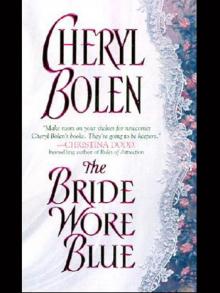 THE BRIDE WORE BLUE
THE BRIDE WORE BLUE Miss Hastings' Excellent London Adventure (Brazen Brides Book 4)
Miss Hastings' Excellent London Adventure (Brazen Brides Book 4)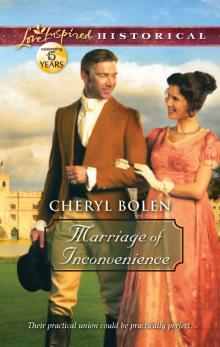 Marriage of Inconvenience
Marriage of Inconvenience Ex-Spinster by Christmas: House of Haverstock, Book 4
Ex-Spinster by Christmas: House of Haverstock, Book 4 With His Ring (Brides of Bath Book 2)
With His Ring (Brides of Bath Book 2) The Theft Before Christmas (The Regent Mysteries)
The Theft Before Christmas (The Regent Mysteries)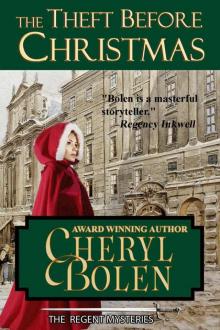 The Theft Before Christmas
The Theft Before Christmas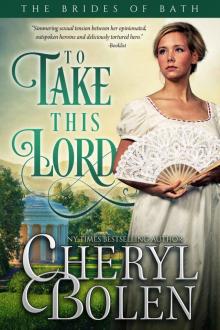 To Take This Lord (The Brides of Bath Book 4)
To Take This Lord (The Brides of Bath Book 4)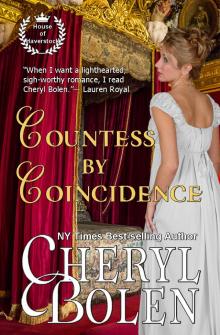 Countess by Coincidence
Countess by Coincidence Captivated by His Kiss: A Limited Edition Boxed Set of Seven Regency Romances
Captivated by His Kiss: A Limited Edition Boxed Set of Seven Regency Romances A Birmingham Family Christmas (Brazen Brides Book 5)
A Birmingham Family Christmas (Brazen Brides Book 5)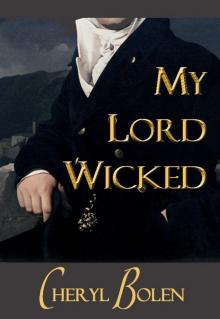 My Lord Wicked (Historical Regency Romance)
My Lord Wicked (Historical Regency Romance) A Duke Deceived
A Duke Deceived The Earl, the Vow, and the Plain Jane
The Earl, the Vow, and the Plain Jane The Bride's Secret
The Bride's Secret The Earl's Bargain (Historical Regency Romance)
The Earl's Bargain (Historical Regency Romance) Rebels, Rakes & Rogues
Rebels, Rakes & Rogues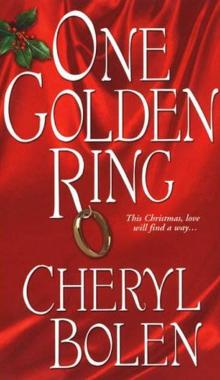 One Golden Ring
One Golden Ring